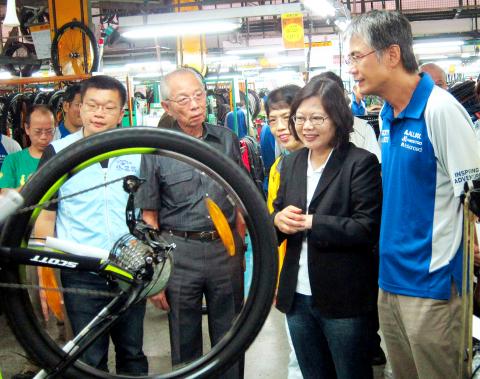Democratic Progressive Party (DPP) Chairperson Tsai Ing-wen (蔡英文) yesterday lauded Giant Bicycle as a model for Taiwanese businesses and touted the development of “local economies” as a crucial factor in turning the economy around.
Competitive, successful and also able to collaborate with rivals, Giant — the world’s largest bicycle manufacturer, an original equipment manufacturer and an original brand manufacturer — could serve as the best example for Taiwanese businesses, Tsai said after a visit to the company in Dajia (大甲), Greater Taichung.
Tsai praised the perseverance and vision of King Liu (劉金標), who founded the company in 1972 and saved it from bankruptcy by transforming it into a global brand, and his decision to manufacture high-end products and leave cheaper products to his Chinese competitors.

Photo: CNA
Successful entrepreneurs, such as Liu and late Apple founder Steve Jobs, create or transform markets by changing people’s values and emotions, said Tsai, who is in the middle of her 11-day campaign trip along the west coast.
One of Giant’s successes, Liu told Tsai in a briefing, is that it manages to develop its own brand and also manufacture bicycle components for its competitors.
Drawing an analogy between Liu’s business operation model and Taiwan’s political scene, Tsai said the major political parties should also be able to compete and collaborate at the same time, which was why she had initiated the formulation of a “Taiwan consensus.”
However, Tsai said that not every Taiwanese company can be as successful or globalized because most private companies are small and medium-sized enterprises.
Tsai repeated her call from her presidential platform for a development of “local economies” based on local characteristics, produce and craftsmanship.
Speaking in Tongsiao (通霄), Miaoli County, Tsai said it was imperative to revive the wood sculpture industry and make it once again the pride and economic heart of the town.
She has highlighted the same things on previous campaign stops.
In Kanding Township (崁頂), Pingtung County, she lauded the success of a sesame oil -manufacturing corporation that has been passed down five generations. The 130-year-old company controls 70 percent of the sesame oil market in Taiwan and is now selling its products in Japan and the US.
In Pingtung County’s Chaozhou (潮州), Tsai talked about developing the town’s rich culture of traditional art, including puppetry, shadow puppetry and Taiwanese opera, into an industry that would eventually boost its economy.
Along with the “New Agriculture Movement,” which encourages young people to return to their hometowns and work in the agricultural sector, Taiwan could develop many niche industries that would eventually benefit the domestic market and create jobs, as long as energy is devoted to developing local economies, Tsai said.
However, competitiveness is crucial at the end of the day, she said.
Citing the example of Giant, Tsai said a competitive business could withstand the impact of free-trade agreements (FTA), such as the one recently signed between South Korea and the US.
In reference to the signing of FTAs with other countries, Tsai said that Taiwan could not afford to depend on Beijing’s “goodwill.”
“If the possibility of signing FTAs with certain countries is slim in the short term, we should try to approach the issue using bloc-building measures, which is exactly what the US and the EU had proposed,” she said.

Alain Robert, known as the "French Spider-Man," praised Alex Honnold as exceptionally well-prepared after the US climber completed a free solo ascent of Taipei 101 yesterday. Robert said Honnold's ascent of the 508m-tall skyscraper in just more than one-and-a-half hours without using safety ropes or equipment was a remarkable achievement. "This is my life," he said in an interview conducted in French, adding that he liked the feeling of being "on the edge of danger." The 63-year-old Frenchman climbed Taipei 101 using ropes in December 2004, taking about four hours to reach the top. On a one-to-10 scale of difficulty, Robert said Taipei 101

Nipah virus infection is to be officially listed as a category 5 notifiable infectious disease in Taiwan in March, while clinical treatment guidelines are being formulated, the Centers for Disease Control (CDC) said yesterday. With Nipah infections being reported in other countries and considering its relatively high fatality rate, the centers on Jan. 16 announced that it would be listed as a notifiable infectious disease to bolster the nation’s systematic early warning system and increase public awareness, the CDC said. Bangladesh reported four fatal cases last year in separate districts, with three linked to raw date palm sap consumption, CDC Epidemic Intelligence

Two Taiwanese prosecutors were questioned by Chinese security personnel at their hotel during a trip to China’s Henan Province this month, the Mainland Affairs Council (MAC) said yesterday. The officers had personal information on the prosecutors, including “when they were assigned to their posts, their work locations and job titles,” MAC Deputy Minister and spokesman Liang Wen-chieh (梁文傑) said. On top of asking about their agencies and positions, the officers also questioned the prosecutors about the Cross-Strait Joint Crime-Fighting and Judicial Mutual Assistance Agreement, a pact that serves as the framework for Taiwan-China cooperation on combating crime and providing judicial assistance, Liang

US climber Alex Honnold left Taiwan this morning a day after completing a free-solo ascent of Taipei 101, a feat that drew cheers from onlookers and gained widespread international attention. Honnold yesterday scaled the 101-story skyscraper without a rope or safety harness. The climb — the highest urban free-solo ascent ever attempted — took just more than 90 minutes and was streamed live on Netflix. It was covered by major international news outlets including CNN, the New York Times, the Guardian and the Wall Street Journal. As Honnold prepared to leave Taiwan today, he attracted a crowd when he and his wife, Sanni,